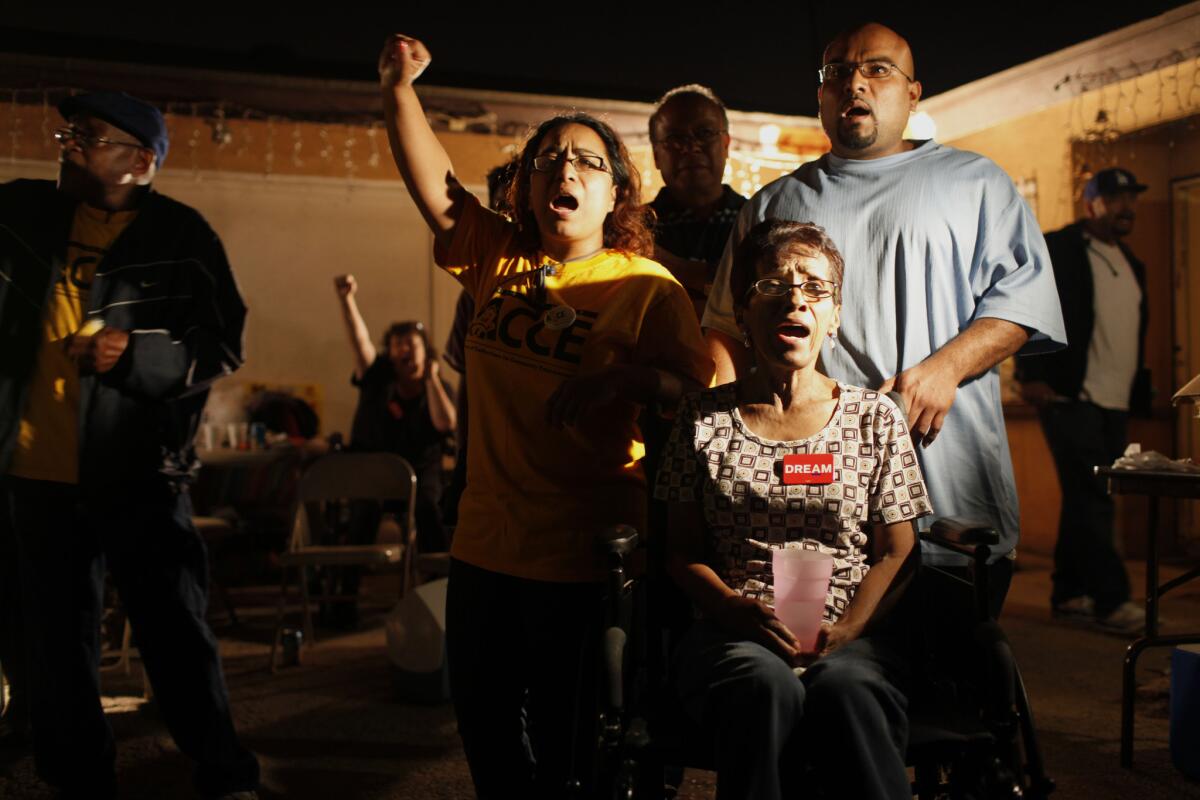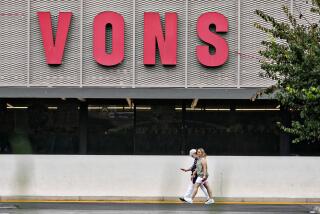Public hearing planned on proposed sale of OneWest Bank to CIT Group

Rejecting an unusual email campaign fomented by a top bank officer, regulators decided to hold a public hearing later this month in Los Angeles on the planned $3.4-billion takeover of OneWest Bank in Pasadena.
The decision, announced Friday, came one month after OneWest Chief Executive Joseph M. Otting had set up a website that generated form letters urging the regulators to approve the merger without a hearing.
Supporters of the purchase by CIT Group, a major New York commercial lender, flooded the Federal Reserve and the Office of the Comptroller of the Currency with more than 2,000 form letters. Opponents delivered petitions to regulators this week with more than 15,000 signatures calling for the deal to be denied.
Analysts had questioned Otting’s tactic, saying it ran the risk of alienating the Fed and some community groups that might otherwise have supported the deal.
Eventual approval of the deal was expected, nonetheless.
“We must have attended at least a dozen Federal Reserve hearings on bank mergers during the bank [merger and acquisition] wave of the late 1990s,” said Guggenheim Partners analyst Jaret Seiberg. “The Federal Reserve approved every single merger after the hearing.”
The Fed, which regulates bank holding companies, and the OCC, which regulates national banks, said the hearing would provide an opportunity to examine the public benefit provided by the merger, including a review of the banks’ performance under the Community Reinvestment Act of 1977.
The CRA requires banks with government-insured deposits to serve the needs of low- and moderate-income customers. Proposed bank mergers often provide groups advocating for the poor a chance to obtain additional pledges of assistance from the banks.
For the CIT-OneWest deal, regulators said they also would consider “the effects of the proposal on the stability of the U.S. banking or financial system.” The merger would create a company with $69 billion in assets, above the $50-billion threshold for what regulators deem systemically important financial institutions that could be subjected to greater scrutiny.
Advocacy groups have split on the proposal, with some praising OneWest’s support for education and other programs in tough urban neighborhoods.
Faith Bautista, president of the National Asian American Coalition, said her group supports the merger. She said she has seen OneWest provide loans and contracts to minority businesses and help members of her group modify troubled mortgages to avert foreclosure.
OneWest executives “are committed to the good of the community” and Otting has promised to earn an outstanding CRA rating from regulators, Bautista said.
Others protested the deal, arguing that OneWest’s pledges are vague and that the bank has done too little to support minority and low-income neighborhoods. They also contended that the deal would create another giant bank underwritten by taxpayer subsidies.
“We’re hopeful this hearing won’t be a dog-and-pony show by the bank followed by a rubber-stamp approval of the merger,” said opponent Kevin Stein, associate director of the California Reinvestment Coalition. “People are watching to see how the regulators will respond to a proposed merger that would create a too-big-to-fail bank.”
Another critic, the Greenlining Institute, said: “The communities that will be impacted by this deal need to be heard, and the just-announced hearing represents an important step in that direction.”
Otting didn’t immediately respond to a request for comment. Neither did Steven T. Mnuchin, chairman of OneWest’s holding company, or CIT’s chairman, John A. Thain.
OneWest’s owners, including hedge fund operators Mnuchin, George Soros and John Paulson, created OneWest from the remains of IndyMac Bank, a specialist in unconventional mortgages whose 2008 failure cost the Federal Deposit Insurance Corp. a record $13.1 billion.
As part of that deal, the FDIC agreed to shoulder billions of dollars in losses on defaulted IndyMac loans under a loss-share agreement, which would continue to benefit the merged bank.
Opponents also noted that CIT was one of the few financial firms that received bailout funds but never repaid the money. CIT’s $2.3 billion in taxpayer aid was discharged later in bankruptcy proceedings.
The hearing on the deal begins at 8 a.m. on Feb. 26 at the Federal Reserve building on Grand Avenue in downtown Los Angeles. Details are available at the Fed website.
More to Read
Inside the business of entertainment
The Wide Shot brings you news, analysis and insights on everything from streaming wars to production — and what it all means for the future.
You may occasionally receive promotional content from the Los Angeles Times.











